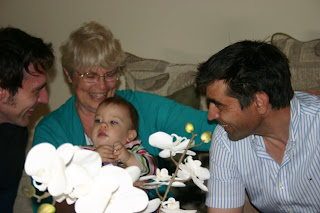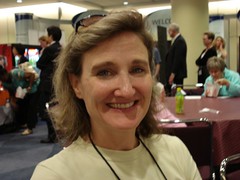Chekhov is often cited as one of the greatest of short story writers. Still, he seems to be an acquired taste, and perhaps not one to whom a reader might go for shoring up a battered psyche, or to seek some uplifting or inspirational energy. First readings of Chekhov can be heavy affairs. Characters sometimes seem hugely stoic, and their complications never seem to resolve; indeed, they seem to arrive at the end of the story no closer to a resolution of their conflicts than at the beginning. The story seems to have no discernible end. The vast Russian settings, enormous divergence of living conditions between nobility and peasantry, and the absolute power of one over the other, these elements can inject some tensions into the stories, but basically the stories are more about recurrent ordinary human weaknesses and failings than ennobling examples of struggle and triumph.
Whence, then, the acquired taste for Chekhov's stories? David Jauss, writing in
The Writer's Chronicle, Mar./Apr. 2010, offers some insight. His article, "Returning Characters to Life: Chekhov's Subversive Endings," examines how Chekhov tends to end his stories by returning his characters to life and the problems created either by their change or their failure to change." In his stories, even when the character changes, "their changes either fail to last, merely complicate the existing conflict, or create a new and often greater conflict."
Today's writers who have had some exposure to degree programs, seminars, or workshops, usually work within the classic model of beginning with a character who faces some sort of major conflict, the conflict intensifies, often interrupted by other sub-conflicts, until there is some climax at which the problem(s) is resolved, or not, leaving the character changed in some conclusive manner thereafter. Not so with Chekhov: "But for all of their apparent inconclusiveness, his stories do have endings; they're just not the kinds of endings favored by...the average viewer of
The Sopranos." Nice touch, that, hey? "They are subversive endings, endings designed to undercut our expectations and, thereby, force us to examine our conceptions about life and human nature."
Jauss cites and examines a wide array of Chekhov stories to demonstrate the various categories of subversive endings used by Chekhov to such powerful effect. Jauss says "Many of today's writers write as if unaware of some of the possibilities Chekhov opened up, and thus they end their stories in highly predictable and conventional ways." Jauss's article is suggested as a worthwhile reference for writers to broaden horizons for structuring their stories. A list of Chekhov's subversive endings as categorized by Jauss will give some idea of the range and depth of analysis provided:
1) Anti-Epilogues
2) Reverse Epilogues
3) Echo Endings
4) Chiastic Endings
5) False Climaxes
6) Omitted Climaxes
7) External Climaxes
8) Temporary Climaxes
9) Complication-creating Climaxes
10) Conflict-creating Climaxes
11) Extended Anti-Climaxes
12) Shifts in Address, Tense, and/or POV
The chance to revisit and appreciate Chekhov's stories will be an added benefit.

Okay, so I've promised to give some snapshots, some scenes, from the Amazing Family Reunion. One of the best echoes in my mind from that event is the moment my two adult sons, David and Michael, got their first look at each other after two years apart. In that two years, lots of things have happened. Both became husbands and dads in that two year span, and I had the great joy of holding both one year-old Cecilia, and (then) one month-old Anika Faith.
But one of the most startling moments for me came afterwards, looking at the pictures, seeing things I had not seen before. In one amazing picture (take a look!) I am holding Ceci, and my two sons are looking across us at each other, sharing a brotherly memory.
They are mirror images in this picture, and remind me so much of their dear Dad.
But, being a writer, I couldn't help but think what a powerful set-up this is for story, how mirror images in our stories can tell so much. I'm thinking of this today, as I've just done the final (yes, really it is) rewrite of my last chapter for FINDING NONNA.
I am delighting in the wonderful mirror scene I see reflecting the first chapter. I tell my students often that a well-written first chapter is like an arrow pointing to a mirror chapter at the end. It's fun to see it working here in my latest book--Ellie, rescuing the injured snow goose in the first chapter, and at the end, after a hard journey of spirit, rescuing in a totally different way. Ellie is changed, but the elements of chapter one are present in this final chapter, creating for me (and hopefully for the reader) a real Aha! moment.
Like the Aha! I experienced looking at this picture of my two sons, seeing reflected in them my husband, and their love for each other, and the blessing they each have in their new families.
Mirror images of joy.

In finishing three short stories, novellas really, in the "Elephanta Suite," by Paul Theroux, the crafting of convincing, satisfying endings for a story came to mind. Theroux's stories, all set in India, are engrossing and beautifully written, with the endings for the first two stories powerful and seamless, and convincing, but the ending of the final story, "The Elephant God," seemed not to fit the portagonist's character. The story is gripping until that point, but though the protagonist, an American woman, looking for a spiritual life while living in an ashram and simultaneously working as an instructor of American speech patterns for employees of a technological call-center, is a resourceful, strong-willed woman, her dramatic retaliation against one of the employees who assaulted her is not quite believable. Though she's been stalked and abused by this man, her last, cold, calculating action seemed over the top, though satisfying to some degree.
Endings were on my mind when I read an interesting essay in Writer's Chronicle, Nov. 2007, "A Tale of Two Endings: Dicken's Great Expectations," by Douglas Bauer. Dickens' original manuscript ended on what seemed a contrived, chance meeting between Estelle and Pip in the city, and a parting between them that seemed final. Bauer says, "�if you read Great Expectations as a novel that steadily acquires real emotional and psychological traction, then Dickens's original ending—with its almost contemporary, quietly stated irony, bracingly free of his famous sentimentality; and one that's contemporary too in its powerful truncation (all those what-ifs" that get said in all that isn't said)—is the preferable conclusion."
However, an author friend of Dickens who was asked to review the original manuscript convinced him to write a more hopeful ending. Dickens's rewrite hedged a bit, making it seem like a continued relationship between Estelle and Pip was foreseen, though the final line was left somewhat ambiguous—"I saw the shadow of no parting from her." That version got published, and the following year (1862) in a second printing, apparently now more satisfied with the idea, Dickens made the line less ambiguous: "I saw no shadow of another parting from her."
Perhaps Theroux might also have received suggestions to have his ending less extreme, a more subtle irony, but he went with a powerful truncation concept. It's still got me thinking, so perhaps it did its job.
Some of Bauer's other thoughts on endings were also interesting: "... any ending that succeeds both culminates and at the same time continues the story…the mix of these two factors naturally varies according to whether the writer's principal desire is, on one hand, to bring everything together, or, on the other, to leave matters more elliptically open. But both qualities, culmination and continuation, are fundamentally always present." And, "The question, then, facing the writer is how to write an ending that benefits from all the complicated momentum that has been funneled into it; one that sounds its confidence and retains a narrower but still resounding power, even as it sings its final notes alone." Not bad.
 This episode of Just One More Book! is part of our showcase coverage of the International Reading Association’s 52nd annual conference.
This episode of Just One More Book! is part of our showcase coverage of the International Reading Association’s 52nd annual conference.
Mark speaks with Alicia Logey, the French Immersion Coordinator with the Surrey School District in British Columbia, about the challenges of literacy in a multilingual environment – be it school or home.
Participate in the conversation by leaving a comment on this interview, or send an email to [email protected].
Tags:
Alicia Logey,
French Immersion,
IRA2007,
literacy,
MulitilingualAlicia Logey,
French Immersion,
IRA2007,
literacy,
Mulitilingual



 This episode of Just One More Book! is part of our showcase coverage of the
This episode of Just One More Book! is part of our showcase coverage of the
Peggy,
Very good picture and a great post. Fmily ties bring in so many ideas with them.